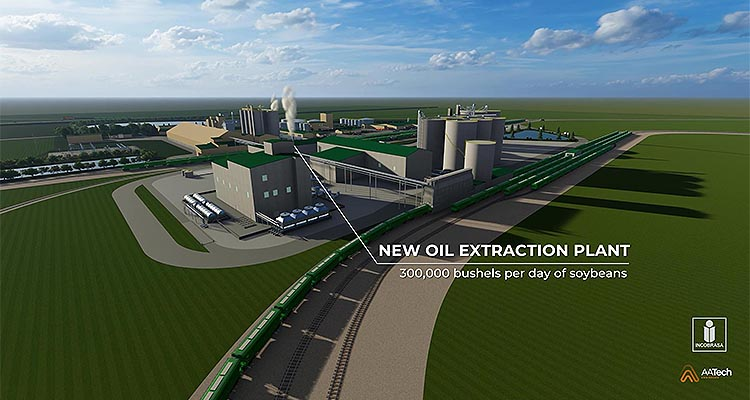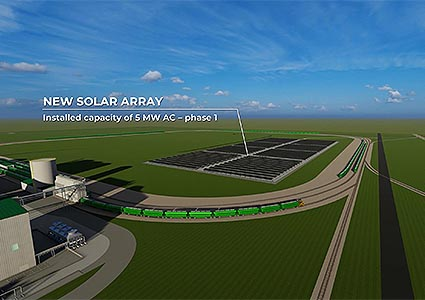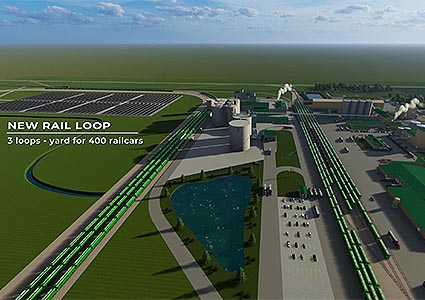
Explore how Incobrasa Industries is leading the charge in the biodiesel revolution
Based in Central Illinois, Incobrasa Industries Ltd (Incobrasa) is a soybean processing and biodiesel manufacturing company. With over 70 years of experience in the industry, Incobrasa stands as a leader in the production of top-quality oilseed products and biodiesel fuel. Originally established in Brazil, the company’s relentless efforts and expertise in agriculture empowered its expansion into the US in 1982. Its longevity in the marketplace and continued success are attributed to the team’s extensive experience, hard work and commitment to excellence. Kerry Fogarty, Quality Control Manager, tells us more about the company’s milestones.
 “Brazilian-owned since its inception in 1997 in Illinois, Incobrasa was established by our current owners’ father. At the time, it operated crushing plants in Brazil before expanding into the US, strategically picking a location in the heart of soybean country. The site is ideally connected to nearby railroads and an interstate system for transportation. Initially focused on crushing soybeans to produce crude soybean oil and animal feed, Incobrasa operated for about a year and a half before the plant shut down due to plummeting vegetable oil prices at $0.15 a pound. However, in 2001, we expanded by building a refinery to refine vegetable oil on-site and sell it in bulk to two nearby packaging facilities. In 2002, we changed our approach and began packaging our oil in-house. While the owners may not have initially considered biodiesel, in 2006, someone visited the plant and highlighted that we possessed feedstock for a biodiesel plant, encouraging us to investigate further. Thus, after consideration, we constructed a biodiesel plant on our premises, initially producing 30 million gallons per year. Following several upgrades, we now boast an annual production of 75 million gallons. The journey to achieve this figure has been quite bumpy, prompting us to ask the Illinois Environmental Protection Agency for additional throughput capabilities in our biodiesel plants. Frequent changes in US policy have presented hurdles, with expired government incentives negatively affecting biodiesel production. Even though Congress regularly renews these incentives, the unpredictable nature of the policy has made it challenging for companies like ours to plan for the future,” he begins.
“Brazilian-owned since its inception in 1997 in Illinois, Incobrasa was established by our current owners’ father. At the time, it operated crushing plants in Brazil before expanding into the US, strategically picking a location in the heart of soybean country. The site is ideally connected to nearby railroads and an interstate system for transportation. Initially focused on crushing soybeans to produce crude soybean oil and animal feed, Incobrasa operated for about a year and a half before the plant shut down due to plummeting vegetable oil prices at $0.15 a pound. However, in 2001, we expanded by building a refinery to refine vegetable oil on-site and sell it in bulk to two nearby packaging facilities. In 2002, we changed our approach and began packaging our oil in-house. While the owners may not have initially considered biodiesel, in 2006, someone visited the plant and highlighted that we possessed feedstock for a biodiesel plant, encouraging us to investigate further. Thus, after consideration, we constructed a biodiesel plant on our premises, initially producing 30 million gallons per year. Following several upgrades, we now boast an annual production of 75 million gallons. The journey to achieve this figure has been quite bumpy, prompting us to ask the Illinois Environmental Protection Agency for additional throughput capabilities in our biodiesel plants. Frequent changes in US policy have presented hurdles, with expired government incentives negatively affecting biodiesel production. Even though Congress regularly renews these incentives, the unpredictable nature of the policy has made it challenging for companies like ours to plan for the future,” he begins.
Expanding operations
Moving back to the present day, Kerry provides more insight into Incobrasa’s operational footprint. “In 2019, our production capabilities surged from 27 million to 40 million bushels per year. This increased production rate on the crushing side provides additional feedstock for the biodiesel plant. Additionally, this also empowered us to create more animal feed, given the symbiotic relationship between oil and feed production from soybeans. We are currently constructing another soybean crushing plant to elevate our crushing capacity to 80-to-98 million bushels per year, effectively doubling our vegetable oil production at the same time. This additional oil can either be refined and packaged or converted into biodiesel,” he informs.
Biodiesel is currently a hot topic across the world due to its role in the grand scheme of sustainability. Kerry discusses how Incobrasa is transitioning to more eco-friendly practices.
“I believe that Incobrasa owes much of its success to biodiesel. Like I said earlier, vegetable oil prices were incredibly low when Incobrasa first started. Besides, there was no demand for vegetable oil, so we hardly made any profit out of it. Luckily, the rise of biodiesel greatly influenced vegetable oil prices, leading to an increase from $0.15 to $0.75 per pound in a relatively short amount of time. It’s important to note that when soybeans are crushed for biodiesel, the process generates a surplus of animal feed, because these two products are intertwined. Thus, incentivizing soybean crushing for biodiesel production actually floods the market with more soybean meal for animal feed, ultimately lowering food costs and enhancing the availability of food. While biodiesel production may reduce the availability of vegetable oil for products like potato chips and pet food, its impact on overall food supply is relatively insignificant.
 “As we are based in Illinois, a state that has incentivized the use of biodiesel, our truckers are exempt from state excise tax when purchasing fuel containing at least 11 percent biodiesel. As of 1st April 2024, this threshold increased to 14 percent, and it is set to rise to 17 percent in April 2025. In 2026, fuel will need to contain no less than 20 percent biodiesel to qualify for the excise tax exemption. By continuing to incentivize biodiesel usage this way – and hopefully, with the threshold continuing to rise – the demand for it will grow in Illinois. Thus, Incobrasa is well-positioned to continue supplying the state with biodiesel,” he enlightens.
“As we are based in Illinois, a state that has incentivized the use of biodiesel, our truckers are exempt from state excise tax when purchasing fuel containing at least 11 percent biodiesel. As of 1st April 2024, this threshold increased to 14 percent, and it is set to rise to 17 percent in April 2025. In 2026, fuel will need to contain no less than 20 percent biodiesel to qualify for the excise tax exemption. By continuing to incentivize biodiesel usage this way – and hopefully, with the threshold continuing to rise – the demand for it will grow in Illinois. Thus, Incobrasa is well-positioned to continue supplying the state with biodiesel,” he enlightens.
With the company set for further growth in the biodiesel sector, Kerry unveils Incobrasa’s endeavors for the remainder of 2024. “For the rest of this year and the next two, we will be focused on building our plant, which should be ready in early 2026. While boosting our capabilities, the new facility will effectively double the number of soybeans we will need to purchase for biodiesel production. Consequently, we will have to source these soybeans from a slightly broader area – albeit still local – than our current gathering range. One factor behind the decision to expand the plant is our strategic location in the heart of soybean country, along with the presence of a river about 100 miles away. Currently, many locally grown soybeans are transported through this river to the Gulf and subsequently crushed overseas. Incobrasa’s objective is to retain these soybeans in the US and process them in its own facility. Therefore, by 2026, we will be able to source soybeans locally and crush them in our new plant instead of exporting them to India or China. This process will result in more soybean meal being available for sale to large poultry farms across the US,” he states.
Sustainability strategy
Looking further afield, Kerry lays out his vision for Incobrasa’s long term future. “In the next five-to-ten years, we aim to already be operating from our new plant. While the plant is being built, we are also implementing a solar field to make it sustainable. Starting with a modest 50-acre field, we have room to add two more within the next ten years. I believe that if we implement all three solar fields, they could supply enough energy to make our plant electrically self-sustaining. Indeed, three 50-acre solar fields would generate about two-to-three megawatts apiece, which is approaching our expected usage when the new plant comes online. Additionally, we plan on doubling our biodiesel capacity from 75 million gallons to 150 million gallons annually. However, this expansion relies on completing the construction of our new crushing plant, which will supply the vegetable oil required for biodiesel production,” he ends.
By upholding its dedication to sustainable practices and pioneering biodiesel, Incobrasa is set to further propel its growth in the years ahead.